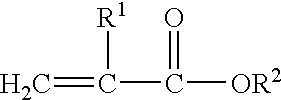Water-in-oil emulsions with anionic groups, compositions, and methods
a technology of anionic groups and water-in-oil emulsions, applied in the field of water-in-oil emulsions, can solve the problems of low ph stability of carboxylic acid functional polymers, product unable to allow or enhance the ability of adhesive products,
- Summary
- Abstract
- Description
- Claims
- Application Information
AI Technical Summary
Benefits of technology
Problems solved by technology
Method used
Image
Examples
example 2
[0112]Example 2 is also a water-in-oil emulsion containing povidone / iodine USP wherein the water phase has a pH of 3-4. The composition of the water-in-oil emulsion is given in Table 2a.
[0113]
TABLE 2aComposition of Water-in-oil EmulsionWeightWeightCompound(grams)(percent)Oil PhaseExample 220 percent AMPS Copolymer / 15.013.880 percent IPPE / AA2.52.3DOCH5.04.6DIPS20.018.0PPG (15) SE6.05.5Water PhaseWater49.545.6MgSO4.7H2O0.50.46PVP / I10.09.2
[0114]The process for making the water-in-oil emulsion was the same as in Example 1.
[0115]The water-in-oil emulsion made with the SMA / IOA / AMPS polymeric emulsifier was stable through 1 freeze / thaw / centrifuge cycle. Complete results are summarized in the Table 2b.
[0116]
TABLE 2bWater phase pH and Water-in-oilEmulsion Viscosity, Stability and AppearanceEx.pHViscosityStabilityAppearance23ThickUniform for 1Uniform andfreeze / thaw / darker browncentrifuge cycle
example 3
[0130]A series of oils were applied to forearms of various individuals, which were recently washed with white soap and completely dried in a thin film, by applying a drop and rubbing it around with a finger. A single drop (about 20 milligrams (mg)) covered an area approximately 20-25 cm2. Immediately after spreading the emollients on the skin a piece of adhesive-coated incise drape material commercially available under the trade designation IOBAN II from 3M Co., St. Paul, Minn., was placed over the emollient area. The adhesion was evaluated qualitatively after 1 minute and 5 minute intervals in contact with the emollient coated skin. The following ratings were used to evaluate adhesion:[0131]6=better than adhesion to dry skin.[0132]5=equal to Ioban™ adhesion to dry skin at a near-by site[0133]4=slightly less than adhesion to dry skin[0134]3=less than adhesion to dry skin[0135]2=much less than adhesion to dry skin[0136]1=very poor—almost falls off
[0137]
TABLE 4Results of IOBAN II Adhe...
PUM
| Property | Measurement | Unit |
|---|---|---|
| Fraction | aaaaa | aaaaa |
| Equivalent weight | aaaaa | aaaaa |
| Fraction | aaaaa | aaaaa |
Abstract
Description
Claims
Application Information
 Login to View More
Login to View More - R&D
- Intellectual Property
- Life Sciences
- Materials
- Tech Scout
- Unparalleled Data Quality
- Higher Quality Content
- 60% Fewer Hallucinations
Browse by: Latest US Patents, China's latest patents, Technical Efficacy Thesaurus, Application Domain, Technology Topic, Popular Technical Reports.
© 2025 PatSnap. All rights reserved.Legal|Privacy policy|Modern Slavery Act Transparency Statement|Sitemap|About US| Contact US: help@patsnap.com



